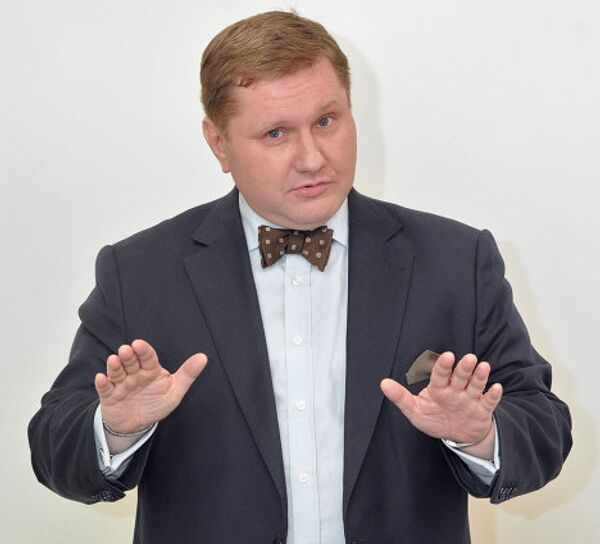If anyone had any doubts about how serious Russian President Vladimir Putin is about the idea of a Eurasian Union, they should banish them now. After his annual address Thursday to the Federal Assembly – a joint session of both houses of parliament plus the cabinet, regional governors and other dignitaries – his determination to do everything possible to make the union a tangible reality became quite clear.

The president's new proposals include opening up the Russian higher education system to high school graduates from all over the Commonwealth of Independent States, who would compete with Russians for university places. Add Putin's staunch refusal to introduce visas for nationals of former Soviet republics in Central Asia, and his singling out of “so-called nationalists” as a political threat, and you see a man on a mission to create (or recreate, depending on one's political viewpoint) what one Moscow wit called “Empire 3.0.” So-called Eurasianism has become if not official ideology, then at least Russian foreign policy's dominant trend.
Coming against the background of the political crisis in Ukraine, Putin's speech serves as a reminder that he has not given up trying to lure Ukraine into the Customs Union and later the Eurasian Union, which is due to officially come into being in 2015. Moreover, events in Ukraine have become a bone of contention between Moscow and Brussels, creating an acute sense in the Kremlin of geopolitical challenge or even a threat to Russian interests coming from the EU.
Russian and Ukrainian government officials are preparing to sign a series of far-reaching economic agreements on December 17, including lifting all bans on the import of Ukrainian foodstuffs and agricultural products into Russia. The Moscow diplomatic rumor mill has it that there is a caveat: Produce from Ukraine's five western regions – the hotbed of Ukrainian nationalism spearheading the protests – will be denied access to the Russian market.
If this turns out to be true, it means that Moscow will not hesitate to deepen Ukrainian divisions in order to achieve its goals. The price to pay for Ukraine's eventual accession to the Eurasian Union could be steep indeed. Moscow may have to plug the $15 billion hole in its neighbor's budget in order to help President Viktor Yanukovych to stay afloat. In exchange, Russian government-affiliated structures may get Ukrainian military hardware production facilities and maybe even a controlling stake in the country's natural gas pipeline network. Even if a pro-European president replaces Yanukovych, they may face such a significant Russian presence in Ukraine’s economy that disregarding Moscow’s wishes in favor of the EU would become problematic to say the least.
Putin clearly sees the Eurasian Union project as his legacy and an alternative to Western values systems: the US one based on the idea of individual freedom, and the European one grounded in the ideas of justice and compromise. It looks like official Russia wants to show that the “development without democracy” slogan mostly associated with Chinese policies is as good for the former Soviet states, especially since Russia and most of its neighbors are more democratic than still-Communist China anyway.
This strategy is not without risks. Firstly, the integration of Ukraine into the Russian sphere of influence is by no means ensured. Bearing in mind the volatility of Ukrainian politics nothing can be excluded. Moreover, in the medium to long term, Ukrainian nation building will continue apace, based on the ideas of separateness from Russia and closeness to the EU.
Without Ukraine, the political and economic meaning of the Eurasian Union is not very evident to the Russian people already weary from the high level of immigration from Central Asia, which in the absence of Ukraine would form the bedrock of the union. This in turn would lead to the inevitable growth of Russian nationalist sentiment intrinsically inimical to the idea of integration with non-Slavic states.
The Kremlin’s Eurasian project is still not wholly defined. But it will no doubt impact not only Russia’s neighbors – including the EU and China – but will remain a contentious and potentially explosive issue domestically.
The views expressed in this article are the author’s and may not necessarily represent those of RIA Novosti.
What is Russia's place in this world? Unashamed and unreconstructed Atlanticist, Konstantin von Eggert believes his country to be part and parcel of the "global West." And while this is a minority view in Russia, the author is prepared to fight from his corner.
Konstantin von Eggert is a freelance commentator and consultant. In 2010-2013 he worked for Kommersant FM radio in Moscow as a commentator and as Editor-in-Chief. He was Diplomatic Correspondent for Izvestia in the 1990s and later the BBC Russian Service Moscow Bureau Editor. Konstantin has also spent some time working as ExxonMobil Vice President in Russia. He was made Honorary Member of the Order of the British Empire by Queen Elizabeth II.
Due West: Ukraine’s Drift West Not About If, But When
Due West: Russia’s Arms Deal With Egypt Is Huge Blow to US
Due West: The Many Uses of Monarchy in Russia
Due West: Khodorkovsky: From Prison to Politics?
Due West: Russia’s Weak Identity Is the Key to Moscow’s Nationalist Riots
Due West: Deciphering the Kremlin: Reading the Runes of Russian Officialdom
Due West: Black Clouds on the Horizon for Russia and Its Neighbors
Due West: A Dividing Issue, 20 Years On: Russia’s 1993 Constitutional Crisis
Due West: Russia’s G20 Summit Promised Little, and Delivered Even Less

